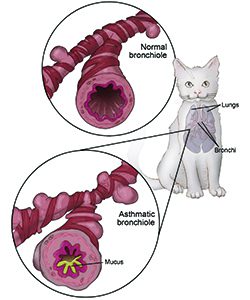Key Takeaways:
- Bronchitis in dogs is a common respiratory condition characterized by inflammation of the bronchial tubes.
- Common symptoms include coughing, wheezing, and difficulty breathing.
- Viral or bacterial infections, allergies, and environmental factors can contribute to the development of bronchitis in dogs.
- Treatment typically involves addressing the underlying cause, providing supportive care, and managing symptoms with medication.
- Prevention measures such as avoiding exposure to irritants and maintaining good overall health can help reduce the risk of bronchitis in dogs.
Are you a dog lover? Do you want to ensure the health and well-being of your furry friend? Then, understanding the topic of bronchitis in dogs is essential for you! Bronchitis is a common respiratory condition that can affect our beloved canine companions. By delving into this subject, you will gain valuable knowledge on how to identify the symptoms, prevent its occurrence, and provide the best care for your four-legged buddy. Whether you're a seasoned pet owner or just starting out, this information will empower you to become a proactive and responsible caregiver. So, let's dive into the world of bronchitis in dogs and unlock the secrets to keeping your furry friend happy and healthy!
Understanding Bronchitis in Dogs and Its Impact on Their Health
What is Bronchitis in Dogs?
Bronchitis is a common respiratory condition that can affect dogs of all ages and breeds. It occurs when the bronchial tubes, which are responsible for carrying air to the lungs, become inflamed and irritated. This inflammation can lead to coughing, difficulty breathing, and discomfort for your furry friend.
The Impact of Bronchitis on Dog's Health
Bronchitis can have a significant impact on a dog's overall health and well-being. The constant coughing and difficulty breathing can cause fatigue and make it challenging for them to engage in physical activities. Additionally, the inflammation in their airways can make them more susceptible to other respiratory infections. If left untreated, bronchitis can lead to more severe complications such as pneumonia.
How Dogs Get Bronchitis and Common Symptoms to Watch For
Causes of Bronchitis in Dogs
Bronchitis in dogs can be caused by various factors, including viral or bacterial infections, environmental irritants like smoke or pollution, allergies, or even underlying medical conditions such as heart disease or lung tumors.
Common Symptoms of Bronchitis in Dogs
If your dog has bronchitis, you may notice some common symptoms such as persistent coughing (especially after exercise or excitement), wheezing or labored breathing, lethargy or decreased energy levels, loss of appetite, and occasionally coughing up mucus.
Treatment Options for Bronchitis in Dogs: What You Need to Know
Veterinary Examination and Diagnosis
If you suspect that your dog has bronchitis, it is crucial to take them to a veterinarian for a proper diagnosis. The vet will perform a thorough examination, including listening to their lungs and possibly conducting additional tests such as X-rays or blood work to rule out other possible causes.
Treatment Approaches for Bronchitis
The treatment for bronchitis in dogs typically involves a combination of medications and lifestyle changes. Your vet may prescribe bronchodilators to help open up the airways, anti-inflammatory drugs to reduce inflammation, and cough suppressants to alleviate the coughing. Additionally, they may recommend environmental modifications such as avoiding smoke or allergens and maintaining proper humidity levels in your home.
Are Certain Dog Breeds More Prone to Developing Bronchitis?
Breeds Prone to Bronchitis
While any dog can develop bronchitis, certain breeds are more prone to this condition due to their anatomy. Brachycephalic breeds with short noses like Bulldogs, Pugs, and Shih Tzus are at higher risk because their airways are naturally narrower. Small breeds such as Chihuahuas and Yorkshire Terriers may also be more susceptible due to their delicate respiratory systems.
Genetic Factors
In some cases, there may be genetic factors that make certain breeds more prone to developing bronchitis. It is essential for owners of these breeds to be aware of the signs and symptoms of bronchitis so they can seek early veterinary intervention if needed.
Preventing Bronchitis in Dogs: Lifestyle Changes to Reduce the Risk
Avoid Exposure to Irritants
To reduce the risk of bronchitis in your dog, it is important to minimize their exposure to irritants such as smoke, dust, or chemical fumes. Keep your home well-ventilated and avoid smoking around your pet. If you live in a highly polluted area, consider using air purifiers or keeping your dog indoors on days with poor air quality.
Maintain a Healthy Lifestyle
Maintaining your dog's overall health is crucial in preventing bronchitis. Ensure they receive regular veterinary check-ups, vaccinations, and maintain a healthy weight. Regular exercise can also help strengthen their respiratory system and reduce the risk of developing respiratory conditions.
Can Humans Catch Bronchitis from Infected Dogs? Precautions to Take
Unlikely Transmission to Humans
While bronchitis is primarily a respiratory condition in dogs, it is rare for humans to catch bronchitis from infected dogs. The viruses or bacteria that cause bronchitis in dogs are typically species-specific and do not easily transfer between species.
Precautions for Pet Owners
However, it is still essential to take precautions when handling a dog with bronchitis. Wash your hands thoroughly after touching or caring for an infected dog, especially before eating or touching your face. If you have a weakened immune system or respiratory conditions yourself, it may be wise to limit close contact with the infected dog until they have recovered.
In conclusion, bronchitis is a common respiratory condition that can affect dogs. It is important for dog owners to recognize the symptoms and seek veterinary care to help their furry friends recover and breathe easier.
How do you know if your dog has bronchitis?
Canine chronic bronchitis is a condition in dogs where they experience a persistent cough for more than a month. The cough may be misconstrued as vomiting and is typically accompanied by retching and wheezing. Dogs may also exhibit tiredness due to the accumulation of excessive mucus, which obstructs their airways.
How long does bronchitis last in a dog?
The dog may have a slightly higher temperature. Bronchitis typically lasts for 2 to 3 days in its acute stage, but the cough can continue for several weeks. It can be challenging to differentiate between severe bronchitis and pneumonia, as bronchitis can progress into the lungs and lead to pneumonia.
Can dogs survive bronchitis?
In many dogs, the airways have sustained permanent damage from the disease and there is no cure. However, with appropriate medical treatment, the symptoms can usually be managed and further damage to the bronchi can be prevented or slowed down. It is not uncommon for dogs to experience occasional episodes of coughing, which will require treatment.
What triggers bronchitis in dogs?
Kennel cough, the flu, and distemper are the primary viruses that commonly lead to acute bronchitis in dogs. Fortunately, veterinarians can administer vaccines to protect dogs from these viruses. Additionally, acute bronchitis can also be caused by bacterial infections, allergies, parasites, or inhaling irritants in the air.
How can I soothe my dogs bronchitis?
An effective method for treating chronic cough in dogs with bronchitis is to maintain moist air. It is not necessary to use a humidifier, as running a hot shower with the bathroom door closed achieves the same benefits. This approach is recommended for providing relief.
Is bronchitis the same as kennel cough in dogs?
Kennel cough is a common term used to describe a contagious respiratory infection in dogs. It is identified by frequent episodes of harsh coughing. The infection is caused by various viruses and bacteria and is spread when dogs come into contact with infected dogs.

















